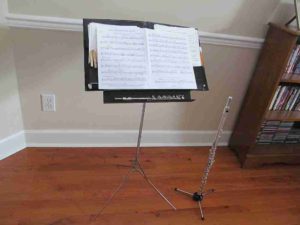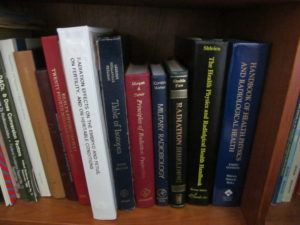LAPSES: Is Proper Usage A Thing of the Past?
When I was in school, much attention was paid to learning correct English. English class covered spelling, punctuation, grammar, syntax, appropriate word choice, and proper pronunciation. It was deemed important to learn all those things with regard to the Spanish language as spoken in the Americas. E.g., in my high school Spanish class, we had exercises in orthography: we studied a paragraph for a short while, put the paragraph away, and then wrote the paragraph as our teacher dictated it to us. It really made us pay attention to spelling and punctuation, I can tell you.
But as a result of the past ten years or so of tutoring at a community college, listening to local, NBC, and CNN news, and reading my local newspaper, I think that rigorous attention to detail in language instruction may be a thing of the past.
Of particular note is the improper or at least nonstandard use of prepositions. When my children were in preschool about 35 years ago, I heard my son using the phrase “on accident”. I corrected him: he was clearly conflating the phrases “by accident” and “on purpose”. Then I found that the reason he was saying “on accident” was that all of the teachers at his preschool said it. I worked very hard to get him change his usage, but I wouldn’t be surprised to hear “on accident” come out of his 39-year-old mouth today.
We hear the word “around” used quite a bit lately instead of “about”, “with regard to”, or “centers on”. This seems oxymoronic: if the focus is at the center, it can’t be simultaneously “around” the center. The word “around” is vague, often ridiculously so, when viewed versus “about” or “with regard to”, e.g., “…attending events around racial justice” (NPR, the Market Morning Report, 3/31/21), “complexities around our voting system” (NPR, Kim Whaley(?), 6/25/20), “guidelines around social distancing” (WBIR, 5/19/21, I think), and, in a story about farmers, “….[concerns] around cotton” (NPR).
Beyond that, while we say “around 9:00 o’clock”, we shouldn’t say “around 9 to 10 o’clock”: giving a range already implies uncertainty, so the word “around” is redundant when a range is given. The same is true of saying “about 8-10 people”: you say either “about 8 people” (or however many is your best estimate) or you say “8-10 people”.
Other examples are given below, with correct usage in curly brackets.
T. Rowe Price promises to “close the gap towards retirement goals {close the gap in meeting retirement goals?}”. (Multiple instances on NPR)
“….remove the statue of Nathan Bedford Forrest out of the Capitol {remove from or take out of}” (WUOT radio, Claire Heddles, 3/10/21)
“….in connection to {with} a Covid cluster” (WUOT radio, Claire Heddles, 3/16/21 and again 3/17/21)
“….dependent on foreign suppliers on {for} various [materials]….next year they’ll do a deeper review on {of} [other subjects]” (NPR, Franco Ordonez, 2/24/21)
“…a departure of {from} [normal practices] [regarding the Arizona ballot audit]” (NPR, 5/25/21)
“….cling onto {to} hope…” (CNN, 6/24/21)
“Mom Raises Awareness on {of} Teen Suicide” (WBIR television, 5/18/21, preview headline)
“The first step on {in} the process of…..” (NPR, Michelle Kellerman, 2/19/21)
“….quit on {of} his own accord…..” (CNN bottom scroll, 5/26/20)
“….similar as {to} that….” (CNN, Don Lemon, 5/26/20)
“….participating on {in} a conference call….” (WUOT radio, 3/24/20)
“You’d never know by {at} first glance that….” (WBIR television, 8/12/20)
“[Governor Pritzker stated that he was] “concerned of {about} the rhetoric”….” (NBC Nightly News, 6/1/20)
“He shared his knowledge of business and healthcare to {with} students at Knoxville College…”, (obituary in the Knoxville News Sentinel, 9/26/21)
“….Padilla….faces federal charges in connection to {with} the Jan. 6 riot….” (Knoxville News Sentinel, Mariah Timms, 9/22/21 or thereabouts; note that many stories in the News Sentinel actually come from their parent news producer, USA Today)
“….goes at the heart of [the matter] {to the heart}” (NPR, Market Morning Report, 7/15/20)
“The consequences of Republicans’ angry, [sic comma] “my way or the highway” philosophy will eventually lead in {to} ruin.” (Knoxville News Sentinel, “GOP Insider Says Enough Is Enough”, Tyler Whetstone, 8/20/21) (But Tyler did use the phrase “enamored of” instead of “enamored with”, bless his heart.)
“….he alleged he was being discriminated {discriminated against} based on his sexual orientation….” (Knoxville News Sentinel, “Tennessee Suit May Test High Court’s Ruling on LGBTQ Rights, Jamie Satterfield, 7/15/20) (Satterfield is a favorite reporter of mine, so although she commits the odd grammatical gaffe from time to time, I read all her stuff. She has the gift of organization: many other reporters’ stories jump around from paragraph to paragraph, but hers flows in a linear fashion. How distressing it is that she left the News Sentinel last month, after 27 years as a reporter for them.)
Another misuse is the phrase “based off”, when the correct phrase is “based on” or “on the basis of”; again, it seems oxymoronic to use “off” instead of “on” when things are thought of as being on their bases.
Other incorrect usages include making a normally intransitive verb transitive (giving it a direct object); picking a word that is somewhat similar in look or sound but not at all in meaning; mispurposing a part of speech; and putting in extraneous words. For example, we have the following.
“….whether or not if it’s working….examine more closely as to where those donations are coming from….” (NPR, Arnie(?) Copeland, 11/5/20)
“….not every student with one of the below conditions {one of the conditions below} is incapable of wearing a mask….” (using “below” as an adjective when it is an adverb) (Knoxville News Sentinel, “KCS Asks To Expand Mask Exemptions”, Isabel Lohman, 9/31/21)
Elizabeth Weise and Romina Ruiz-Goirena (Knoxville News Sentinel, “Invisible Threat of Sea Rise Corrosion”, 7/13/21) say that “While the cause of Champlain Towers South is not yet known….” – surely they have left out a word, such as “failure”, as in “the cause of Champlain Towers South’s failure….”
Rachel Martin of NPR spoke of “….a death rate twice as high than {as}…”, i.e., she flunked a simple as-as comparison. (6/9/20)
“….have awoken that….{awoken to the fact that}” (NPR, 8/6/20)
“While Antoinette failed to win the first challenge, she didn’t let it phase her {faze her}” (Knoxville News Sentinel, “Knoxville Creator Impresses In Premiere of “Making It””, Jake Yoder, 6/26/21
John Becker on Knoxville’s WBIR-TV (7/1/21) said that somebody “recanted how he [did something”; surely the guy “recounted” how he did it. Carrie Johnson of NPR (7/15/21) said that “[someone] was investigating expediently” – surely she meant “expeditiously”. Alexandria Ocasio-Cortez (speaking on the NBC Nightly News, 7/23/20) referred to “a lack of impunity”; I think she meant the opposite. (I admire her energy and spunk, but she often comes across as something of an airhead.)
A weather person on WBIR-TV (I think it was Todd Howell, who often comes up with a grammatical howler), in a single segment, said that “we are not out of the clear yet”; that we have to “correlate the dots”; that “much of us are dry”; that there were “less chances for a shower”; and that “You’d never know by first glance that….” Whew!
A particular pet peeve of mine is the use of some form of “to happen” instead of some form of “to occur”, “to take place”, or “to be held”. For example, we hear of meetings “happening”, as if people just showed up randomly at the same time and started a confab. It is correct to say that, e.g., weather events and accidents happen, but human-planned events are not spoken of that way. This is because “happen” is derived from the very old word “hap”, meaning luck or chance or fortune (as in “good fortune”). So the sense of “happen” is things that occur by chance or by the operation of Divine Providence, or at least that are not foreseen as occurring. But now we are bombarded with “happen”, with even sessions of Congress “happening”. Alison Aubrey, who seems to produce a gaffe regularly, said this: “The President promised a Web site…a Web site didn’t happen” (4/13/20).
Another pet peeve is the phrase “a couple weeks”. It is supposed to be “a couple of weeks”, a phrase in which both “couple” and “weeks” are nouns. “A couple weeks” makes “couple” an adjective modifying weeks. In very informal speech, one could say “a couple weeks” just as one could say “ain’t”, but should a person who purports to be educated really be saying or writing “a couple weeks”, as Terry Spencer, Adriana Gomez Licon, and Kelli Kennedy did in a newspaper article (Knoxville News Sentinel, “DeSantis Firm on Masks As Florida COVID Wards Swell”, 8/4/21)? In the same article, these three wrote “A central tenant {tenet} of his national image….”
Yet another pet peeve is the use of the word “trainings”, either for training courses or in the generic sense of training. I view training as being like rice: you can speak of a single grain of rice, as you can of a single training course, but when you speak of rice in bulk you don’t use an article in front of it, as you don’t in speaking of training in the sense of multiple courses or a general preparation in a particular area. I.e., we don’t say “a rice” or “a training” or “rices” or “trainings”. At the college where I tutor, “trainings” seems to have come into wide usage. But as usual, it is the human resources and other general types who use it rather than the English professors.
On more pet peeve is the current widespread use of “fraught” by itself. My dictionary tells me that “fraught” means “involved” or “connected” and usually is followed by the preposition “with”. “Fraught” by itself does not imply an adverse connection. So one has to say, e.g., “the situation is fraught with difficulty”, not just “the situation is fraught”.
One final giant pet peeve: beginning a sentence with “So,…” when the sentence is not a consequent statement, i.e., it doesn’t follow from anything that was said just before. Many people say this, especially on NPR.
Then there are the slightly loony usages, such as the following.
“[The reporter] recalling [the incident] from witnesses….” {The witnesses are recalling, not the reporter)
“[DNA] allowed [authorities] to estimate what the man might look like {predict, guess at, conjecture}” (CNN, 5/26/20, probably in the bottom scroll)
“The coronavirus couldn’t have come at a worse time for Appalachia, where health conditions are already concentrated {poor? worse than elsewhere in America????} (Knoxville News Sentinel (but with the USA Today logo), sentence pointing to the page on which an article would appear, 3/25/20)
“Support for NPR comes from Kroger, who believes that…..” (NPR, advertisement, 11/12/20; note that Kroger is a corporate entity, not a person)
“If these semiautonomous robots come to pass….” (Alison Aubrey, NPR, 4/26/20; events or conditions come to pass, not objects)
“This is a big undertaking you are endeavoring….” (Noelle King, NPR, 5/18/20; “endeavoring” in this sense takes an infinitive phrase after it, as in “endeavoring to bring to fruition”)
“[We] don’t want to be the brunt of [tourists’] anger {bear the brunt}” (WBIR, 5/19/20, I think)
A superintendant of schools in Knoxville, Tennessee once sent a message to many parents and school board members, saying that one item was “a mute point”. This occasioned a great deal of consternation on the one hand and laughter on the other because the man had a PhD in education. He issued an apology that was more of a chuckle: “Ha, ha, look at the silly mistake I made.” But one had to ask if in fact he had not known the difference between “mute” and “moot”. If he did, didn’t he proof his messages before he sent them? I was glad when he stepped down as superintendent because he struck me as a doofus even before this gaffe.
Why are all these errors being made? I think that it is because people, even college graduates, are not being taught precision in speech as rigorously as they used to be. In eighth-grade English we used to have to diagram complicated sentences, which made us understand the parts of speech and how they act together to produce meaning. However, with the exception of one student in a private Catholic school, in the last dozen years I haven’t encountered anybody under 40 who had to diagram sentences in school.
Many people nowadays – including many educators, apparently – think that correctness in speech, whether written or spoken, does not matter as long as others can figure out what they are saying. But word usage does matter, not just in terms of rendering meaning but in terms of making things easier for people to read or hear and interpret. One shouldn’t have to read a paragraph or sentence several times in order to parse it; one shouldn’t have to miss a spoken sentence because one was trying to puzzle out the meaning of the preceding sentence.
The late Petr Beckmann once made an excellent point about this. He was a professor of electrical engineering who was born in Czechoslovakia and who for many years wrote a monthly newsletter about science, technology, and libertarianism. He observed that when a sentence is properly constructed, it is easy to read and the reader can concentrate on what is being said by the writer (i.e., the ideas he is expressing) and not be distracted by the effort of trying to figure out what the words mean (e.g., whether there is a missing comma that makes a difference in the meaning). Beckmann, although he was not a native speaker of English and so could have been excused for a few lapses, nevertheless made it a point to study and employ correct usage in his newsletter. I think his stuff might have been proofed by someone else, but still the soundness of his writing, in construction at least, could be credited to him because he cared enough to make his stuff correct and thus easy to read.
In my own writing, I try to walk the walk as well as talk the talk. I am a very literal person as regards written and spoken language, so I am surprised that I am almost always successful at working the New York Times Sunday crossword puzzle, a fuzzy logic exercise if there ever was one. I liken my mind to the Death Star of Star Wars fame: if the proton torpedo – the sentence – is not aimed at the correct angle it will not go in and enlightenment will not be produced. Because of this, I strive always to produce my own sentences and paragraphs with correct structure and to have them flow in correct sequence.
Speech can be classified as either informal or formal. We have to be tolerant of informal speech because it is usually what you might call on-the-fly speech and so is more productive of error. We all make mistakes and so we should be forgiving of mistakes made in ordinary conversation, on-the-scene reports of breaking news, etc. But for formal speech that is or can be prepared in advance, our standards should be pretty high. So, for example, even if on-air anchors are reading copy that someone else prepared, they are still responsible, in my view, for errors in what they read because they are supposed to have read it in advance (so that they don’t stumble in reading it) and they thus have had time to correct the copy themselves.
Surely newspapers should have even higher standards than the television news. Even newspapers, which have editors who presumably read and correct all copy, are not immune to the sort of errors I detailed above.
Virtually all the people whose reports we see on television or hear on the radio or whose stories we read in the newspaper went to college. Some of the errors I see or hear make me want to ask sarcastically, “And what college did you say you went to?” But perhaps I should be asking that question not of the young reporters (because we oldies recognize that the standards of education are much lower than they use to be in our young days), but of their editors, who supposedly proofed their stuff. In any case, what passes for a college education these days appears not to be sufficient to produced skilled users of English among people who make their living with words.
I tend to think that rigorous teaching of usage is gone forever, but perhaps there is hope. I say that because I recall an incident in college involving a bunch of faculty members. They were on a committee that was negotiating pay with the university administration and were considering a new contract proposal. Most of the members wanted to approve the contract as written, but two of them – a professor of logic in the math department and a professor of logic in the philosophy department – vehemently argued against it. They wanted the faculty committee to hire a lawyer and have him vet the contract. Eventually they prevailed. The lawyer agreed that one phrase in the contract could be and probably would be construed in any court of law as favoring the administration, to the detriment of the faculty. Backed by his opinion, the committee insisted that the administration change the contract and when that was done, they approved it.
The lesson I take from that is that there is an extensive arena in which word usage matters right down to the last comma: the legal one. In a world growing ever more litigious maybe it will become more and more important that everybody, e.g., as consumers, learn to use words correctly and thus learn to read all sorts of guaranties, warranties, IRA information, binding agreements, etc., as a protection against being taken to the cleaners. (Yes, I was just using the subjunctive, folks.) Maybe the lawyers then will have, in some sense, helped remedy the problem of blatant lapses in usage in public information.
NOTE: Some readers will observe that I don’t always put punctuation marks inside parentheses, instead putting them outside. While this is considered incorrect, at least in the United States, I do it because I am considering the most logical placement of the punctuation with respect to the importance of the parenthesized material to the whole sentence. For example, I would write this: He called his brother a “doofus”. Or this: Why would I say “Cheese”, when I don’t want my picture to be taken at all? Putting the punctuation inside the parentheses in every case calls to mind the saying of Emerson that a foolish consistency is the hobgoblin of little minds…..





